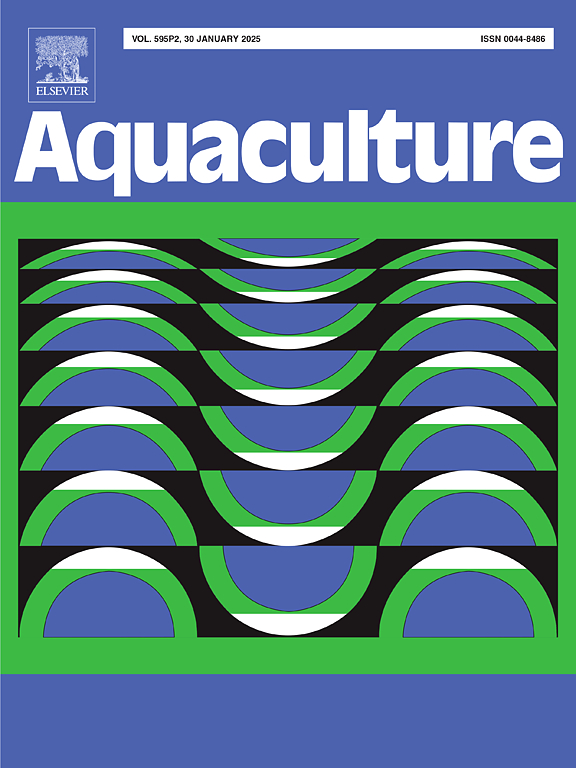孵化后饥饿对海洋观赏虾氧化应激反应和幼虫寿命的影响
IF 3.9
1区 农林科学
Q1 FISHERIES
引用次数: 0
摘要
十足甲壳类动物的幼虫通常依靠外部食物来源来获取营养、生长和生存。然而,在食物供应具有明显季节性的环境中,一些物种的早期幼虫可以在没有外部喂养的情况下发展到后续的幼虫阶段,这一策略被称为同时性初级脂肪营养。为了节省与使用活饲料相关的成本,一些海洋观赏虾的生产商,如Lysmata属的生产商,在它们的第一个动物阶段剥夺了幼虫的食物。虽然这种常见的做法可能不会直接影响幼虫的存活,但它会增加饥饿幼虫的氧化应激反应,并对未来的性能产生负面影响,即在变态阶段。然而,这种影响在水产养殖中仍然很少被探索。在这里,我们通过一系列氧化应激和抗氧化反应的生物标志物,实验评估了不同喂养方式对新孵化的Lysmata seticaudata虾幼虫的影响。结果表明,饥饿可通过提高氧化应激酶活性和总抗氧化能力,促进新孵化幼虫在后续幼虫期的短期应激反应。这种在幼虫发育初期的短暂饥饿期具有显著的长期影响,延迟了幼虫后期的变态时间,导致较大虾的变态。剥夺新孵化的幼虫的食物是水产养殖中的一种常见做法,这是不可取的,因为它破坏了用于对抗氧化应激和促进形态发生和生长的能量之间的平衡,这可能会延长最后一个动物阶段的持续时间,从而影响幼虫后期的状况。本文章由计算机程序翻译,如有差异,请以英文原文为准。
Examination of post-hatching starvation on oxidative stress response and larval life span in the marine ornamental shrimp, Lysmata seticaudata
Decapod crustacean larvae typically rely on external food sources for their nutrition, growth, and survival. However, in environments with pronounced seasonality in food availability, early larvae of some species can progress to subsequent larval stages without external feeding, a strategy known as facultative primary lecithotrophy. To save costs associated with the use of live feeds, several producers of marine ornamental shrimp, such as those of genus Lysmata, deprive larvae of food during their first zoeal stage. While this common practice may not directly affect larval survival, it can increase oxidative stress responses in starved larvae and negatively impact future performance, namely at metamorphosis. Such effects, however, are still little explored in species of aquaculture interest. Here, we experimentally assessed the effects of different feeding regimes on newly hatched larvae of the shrimp Lysmata seticaudata using a range of biomarkers of oxidative stress and antioxidant response. We showed that starving newly hatched larvae promoted short-term stress responses at the subsequent larval stage by increasing the activity of oxidative stress enzymes and the total antioxidant capacity of larvae. Such a brief starvation period at the beginning of larval development had significant long-term effects, delaying the time of metamorphosis to post-larvae and resulting in the metamorphosis of larger shrimp. Depriving newly hatched larvae of food, a common practice in aquaculture, is inadvisable as it disrupts the balance between energy used for combating oxidative stress and promote morphogenesis and growth, which may affect post-larval condition by prolonging the duration of the last zoeal stage.
求助全文
通过发布文献求助,成功后即可免费获取论文全文。
去求助
来源期刊

Aquaculture
农林科学-海洋与淡水生物学
CiteScore
8.60
自引率
17.80%
发文量
1246
审稿时长
56 days
期刊介绍:
Aquaculture is an international journal for the exploration, improvement and management of all freshwater and marine food resources. It publishes novel and innovative research of world-wide interest on farming of aquatic organisms, which includes finfish, mollusks, crustaceans and aquatic plants for human consumption. Research on ornamentals is not a focus of the Journal. Aquaculture only publishes papers with a clear relevance to improving aquaculture practices or a potential application.
 求助内容:
求助内容: 应助结果提醒方式:
应助结果提醒方式:


